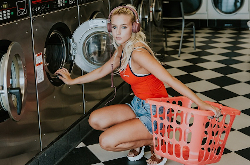세탁물

Today we are going to talk about the fabric we wear on our bodies. In other words, our clothes, right?
Well, yes and no. The word “clothes” is only part of a much larger story. American English has many more specific -- and more colorful -- terms related to these everyday items.
For example, let’s say you carefully select the clothes you plan on wearing to work or a party. Sure, those are your clothes. But it would be better to call it an outfit. The word outfit means there was some planning involved.
In fact, when we compliment people on what they are wearing, we usually say, "Hey, I really like your outfit." We probably would not say, "Hey, I really like your clothes!" It just sounds a little odd.
Our wardrobe also has a sense of planning. A wardrobe is a collection of clothing. It is all the clothing a person owns. If I know a man or woman who always looks sharp, I could say, “That person has an amazing wardrobe! Every item of clothing is gorgeous and fits perfectly!”
Now, even the nicest outfit in the nicest wardrobe collects dirt and wrinkles. Then that outfit becomes dirty clothes. But why use that ordinary term when you can call it laundry! Laundry, very simply, is any fabric -- clothes, linens, towels, sheets and blankets -- that we need to wash.
Some people have a laundry room, an area in their house or apartment with a washer and dryer. People who don't have a washer and dryer in their homes can go to the laundromat.
Now, if you’re like me, doing your laundry can be one item on your laundry list of things to do on the weekend. Often, my Saturday morning begins with a couple loads of laundry. And I don't mind. It relaxes me to do laundry.
Now, a “laundry list” is not a list of the things you need to wash. It is very long list of related things. For example, if you have many small tasks to finish at work, you can say you have a laundry list of projects.
Here's another example: "At the parent-teacher meeting, the principal gave a terrible speech. It was just a laundry list of what the school staff had not done right."
Whether you do your laundry at home, at a laundromat or have a professional do it for you, we all have dirty laundry -- in more ways than one!
In conversation, dirty laundry is much more than soiled shirts and jeans. The expression “dirty laundry” means all those embarrassing things we don't want others to know about us or our families.
We often use this expression as a warning. For example, if your mother catches you telling your friend something about your family, she may say, “Don't air our dirty laundry! Nobody needs to know every sordid detail about our family!"
Now, let's hear these expressions used in a conversation. These two friends are roommates in a medium-sized apartment building. It’s Sunday morning and they are doing their laundry.
Kendra, that is such a cute outfit you’re wearing!
Thanks, Karen! I just updated my wardrobe and got rid of everything that didn’t fit or just didn’t look good on me.
I need to do that. Most of my clothes are too small. Oh, Kendra, I forgot to tell you something that happened yesterday.
What happened?
You know Raphael and Maya, right?
You’re kidding, right? Of course, I know them. They're the loud couple who live upstairs from us and fight all the time.
That’s them. Well, yesterday they had a huge fight in the basement laundry room!
Right here in the basement laundry room?
Oh yeah! And it was Saturday morning. So, half the apartment building was down here doing their laundry.
What did they fight about?
Well, Maya found a woman’s shirt in their laundry that was not hers. So, she accused Raphael of cheating on her! He, of course, denied it. But then she gave him a laundry list of women he's been secretly seeing .
Well, not so secretly, if Maya knew about them.
Good point.
That sounds so embarrassing! It's not good to air your dirty laundry in public like that. They should have had their fight in the privacy of their own apartment.
I totally agree. That way, only you and I would have heard it.
Exactly. Can you hand me the laundry powder?

